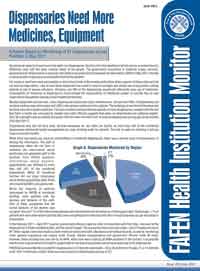ISLAMABAD, July 3, 2011: Government needs to invest more in the state-run dispensaries, the first unit in the healthcare infrastructure, to enable them to effectively cope with the basic medical needs of the people. Investment in medicine supply, services, equipment and infrastructure is seriously warranted since government dispensaries observed by FAFEN in May 2011 showed a worrying lack of capacity to provide safe treatment to patients, according to the FAFEN Health Institution Monitor, released here on Sunday.
For instance, sterilizers were not available in almost two thirds of the monitored facilities while a quarter of those observed did not have syringe cutters. Lack of such basic equipment can result in reuse of syringes and unsafe use of equipment, putting patients at risk of serious infections.
FAFEN Governance Monitors visited 81 dispensaries in 57 districts nationwide – 38 in 25 districts in Punjab, 21 in 14 districts in KP, 18 in 14 districts in Sindh, three in as many districts in Balochistan and one in ICT.
One fifth of the dispensaries monitored nationwide were out of medicines. Unavailability of medicines at dispensaries compromises the responsibility of healthcare system to provide free of cost medicines to the patients visiting primary healthcare facilities.
Besides equipment and services, many dispensaries even lacked basic infrastructure. The buildings of one third of the observed facilities were not in good conditions, around two fifths did not have waiting areas while nearly half (48%) of the monitored dispensaries did not have washrooms for patients. More than half (51%) of the monitored dispensaries lacked arrangements for clean drinking water for patients.. The poor condition and operational capacity of many dispensaries, coupled with the fact that there is hardly any oversight by elected and public officials suggests that state-run dispensaries are suffering neglect. Only 36 visits by elected and public officials were recorded in 81 monitored dispensaries during past three months (February – April 2011).
While there was hardly any issue of understaffing in monitored dispensaries, there was a serious issue of transparency in sharing the information. The staff of dispensaries either did not have or withheld the information about sanctioned and appointed staff in the facilities from FAFEN monitors. Information about doctors’ appointments was withheld by more than half (41) of the monitored dispensaries. While 37 monitored facilities did not share information about female paramedical staff those who shared had 96% occupancy rate.
While the majority of patients interviewed by FAFEN at monitored facilities, were satisfied with the services and behavior of the staff, 29% complained that the overall behavior of the doctors was not good. Around 11% of the interviewed patients were dissatisfied with the behavior of the support staff. Nationwide, 17% of patients who were interviewed said that they were not getting free medicines from the in-house pharmacy as per the doctor’s prescription.
To download complete report, click here
